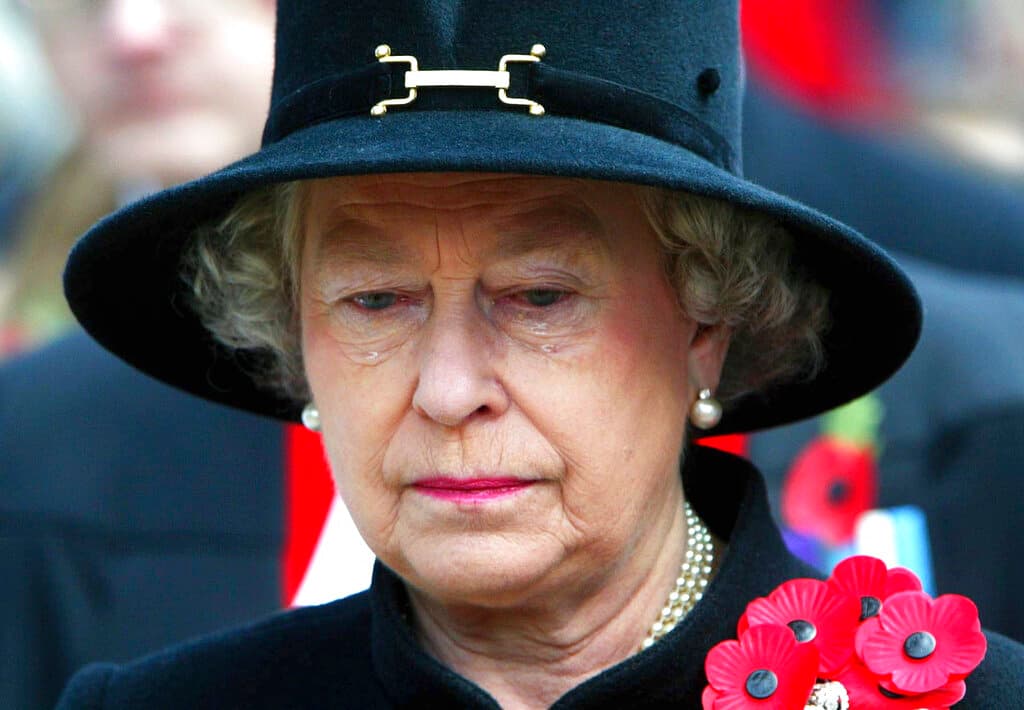Elizabeth II Gave Us a Magnificent Example of Restraint, Though She Understood That Above Her Was Only God
The new king has shown less of a willingness to stand back from the temptation of politics.

The world mourns. Elizabeth II has died. The Royal Commonwealth is in uncharted waters. Not since the death of her father, George VI, in 1952 has there been a change of head of state. For most of us, it has always been “The Queen.”
“The Queen died peacefully at Balmoral this afternoon,” the Buckingham Palace statement reads. “The King and The Queen Consort will remain at Balmoral this evening and will return to London tomorrow.”
The Queen is dead. Long live the King. Such has it been for more than a thousand years. The sudden and “unknown quality” of Elizabeth’s death may unsettle her subjects. For “The Firm” itself, this is all part of the responsibilities, as sad as they may be.
Elizabeth’s heir, Prince Charles, is now King. As of this writing, it is still uncertain, at least to me, what will be his regnal title. “Charles” is considered unlucky among royal circles.
Charles I was unseated and decapitated. Charles II was a “merry” monarch who died without legitimate heirs and whose brother James II succeeded him, “abandoned” the throne, and was replaced by parliament.
George VI was known as Albert — “Bertie” — but took the name of his father, George V, in part to honor his paternal predecessor, in part to put some distance from a dissolute Edward VIII, by a remembrance of Georgian stability.
The newest king, though, has issued a statement. “The death of my beloved Mother, Her Majesty the Queen, is a moment of the greatest sadness for me and all members of my family,” he states. “We mourn profoundly the passing of a cherished Sovereign and a much-loved Mother.
“During this moment of mourning and change, my family and I will be comforted and sustained by our knowledge of the respect and deep affection in which The Queen was so widely held,” her heir concludes.
Elizabeth’s subjects mourn not simply the constitutional head of state, though that is undeniably part of the loss. Foremost, we mourn another human being taken from us. It is only proper that mourning is greatest within the United Kingdom. Britons have lost one of their own.
“England is a domestic country. Here the home is revered and the hearth is sacred,” Benjamin Disraeli observed. “The nation is represented by a family — the Royal Family.”
Disraeli had Queen Victoria in mind, but his sentiments apply easily to Elizabeth, too: “If that family is educated with a sense of responsibility and a sentiment of public duty, it is difficult to exaggerate the salutary influence they may exercise over a nation.”
Disraeli was no less prescient about monarchy’s presence in moments of crisis: “In the hour of public adversity, or in the anxious conjuncture of public affairs, the nation rallies round the Family and the Throne, and its spirit is animated and sustained by the expression of public affection.”
With Elizabeth’s passing, this public affection is much in evidence. The king noted as much, in appreciation. “I know her loss will be deeply felt throughout the country, the Realms and the Commonwealth, and by countless people around the world,” he acknowledged.
Now follows 10 days of public mourning, then a state funeral. An official coronation, in the months to come. In olden days, parliament would be dissolved with the death of the monarch and new elections held to usher in the sovereign. Likely, Britons will be spared this added grief.
None, these days, dare think of politics. Yet apart from the Royal Family, it is as “Sovereign Queen” that most think of Elizabeth. Her strength and source of affection was her apolitical nature — seemingly paradoxical, but she carried it off to magnificent effect for more than 70 years.
Can her successors be so lucky? The indications are not hopeful. As prince of Wales, Charles gloried in having a voice in matters environmental and architectural. Charles went so far as to speak at events condemning global warming. His heir, Prince William, has followed in his father’s social activism steps.
They have not learned the lesson of Aquinas that Elizabeth, no doubt due to her strong faith and religiosity, took so much to heart. “Man is not ordained to the body politic, according to all that he is and has,” Aquinas wrote; “and so it does not follow that every action of his acquires merit or demerit in relation to the body politic.”
Such was the secret of Elizabeth’s success. She knew her duty and she did it. One of her last official acts was to see off one prime minister and to appoint another. She knew, though, the temporal reality of politics, and set her sights on more important matters. As head of the Church of England, she knew there was no one above her, save God.
Historians might yet record that the biggest step Britain took during the reign of Elizabeth was exiting the European Union. The tabloid press suggested that the queen was, privately, a supporter of Brexit, who kept her focus on the Commonwealth. In any event, she kept her profile low on this, and other political questions.
The king, as prince of Wales, though, was all too alert to the “merits and demerits” handed out in the realms of politics and celebrity. Curiously, with its focus on getting the United Kingdom back on track economically and socially, the Conservative administration led by Prime Minister Truss may be key to the future stability of the monarchy.
Such thoughts and fears are for another day. For now, we mourn along with the Royal Family. We celebrate the life and service of the Queen and Mother of her People, Elizabeth II. Requiescat in pace.
BrexitDiarist@gmail.com

